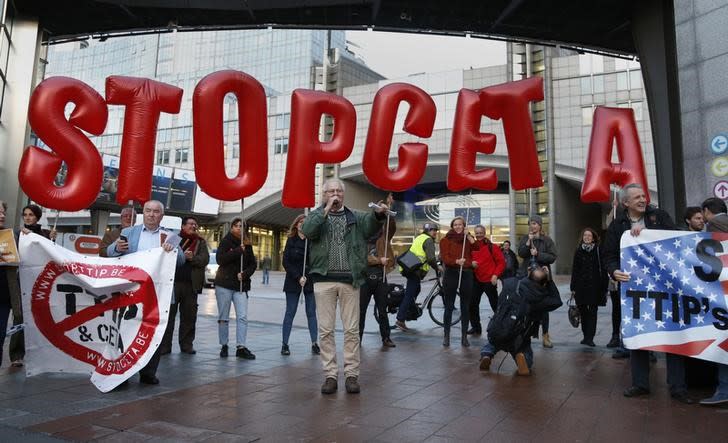Why one region in Belgium has thrown a wrench in Canada’s trade deal with the EU

Three-and-half million people are standing between a landmark trade agreement involving 500 million citizens of the European Union and 35 million Canadians.
The French-speaking region of Wallonia and Belgium has thrown a wrench in plans to get the proposed Comprehensive Economic and Trade Agreement signed this week after seven years of negotiations.
Belgium’s constitution provides each of the country’s three regions veto power during these types of negotiations
And on Oct. 14, Wallonia, which is responsible for about 24 per cent of Belgium’s GDP, voted against the deal.
The decision meant that Belgium was the lone holdout of the EU’s 28 member-states.
But why has a small region become the biggest obstacle to such a massive trade deal?
According to BNN, Wallonia has an unemployment rate of about 10 per cent, which is higher than the rest of the country and the EU average.
But its exports have been on the upswing thanks to increasing sales by its food sector with products such as cheese, craft beer and sugar beets.
And according to the Economist, its “lavishly subsidized farmers” are worried about increased competition from Canada’s own powerful agriculture sector, which produced more than $55 billion worth of exports last year.
Erwin Schopges, a dairy farmer from Walloon who took part in protests against CETA, told the financial magazine that conditions do not stand to improve under the deal as milk prices are already below his production costs.
“We want to trade with Canada, but we would rather not abolish tariffs,” he said.
Wallonia is the only region in Belgium to boast a trade surplus over the past five years.
Critics in the region have also argued that Canadian competition could harm its industrial sector, as well as undercut labour, environment and consumer standards.
And there are deep-seated issues at play that relate to Belgium’s divisions along linguistic lines.
At the beginning of the 20th century, French was the ruling language in the country, dominating politics, education and culture.
And, at the same time, its French-speaking region Wallonia dominated its economy, powered by its coal and iron industries.
But in the 1960s, Belgium underwent a drastic cultural shift, while the need for these resources also dwindled, led by the Dutch-speaking northern region of Flanders.
Despite the country’s changes, Wallonia’s left-wing, working-class politics have remained in entrenched.
And anti-trade sentiments have taken hold with its economically depressed citizens.
“Wallonia is more the old left, the traditional working-class left,” Daniel Beland, a professor who studies federalism and comparative public policy at the University of Saskatchewan, told CBC.
And the Francophone Socialist Party, which has the most seats in Wallonia’s parliament, has backed the anti-trade cause.
“(They fear that) this gives way to abandoning all our socialist priorities in Europe,” Marc Hooghe, a political science professor at the University of Leuven in Belgium, told CBC, adding that the party’s true fear is that major corporations will use CETA and other deals, such as the Transatlantic Trade and Investment Partnership between the United State and the E.U., to overwhelm the continent’s cultural values.
“Both have been combined into this monster of free trade, getting rid of all environmental standards, all social standards. CETA is being sacrificed to stop TTIP.”
However, EU has maintained that its strong safeguards on social, environmental and labour issues will be unaffected.
Meanwhile, proponents say CETA, which promises to eliminate 98 per cent of tariffs between the two powers, will lower barriers to commerce, ramp up trade and could make Europe $8.45 billion a year richer.
And there’s still a chance that the mammoth deal could go through.
The EU has called for patience and said that a summit between the EU and Canada, scheduled for Thursday, is not the final deadline.

 Yahoo Finance
Yahoo Finance 